Why these movies didn't impress Sreehari Nair...
One or many of the films on this list would have made it to another critic's list of the Best Hindi Films of 2018.
But I think we are living in too interesting a period in Indian movies to find comfort in rubbishing the campiness of a Race 3 or the idiocies of a Thugs of Hindostan -- such movies do not affect the consciousness of our time anymore.
Of the films that do affect the consciousness of our time, it is important to note that movies that merely fan our anger OR ones that talk broadly about the broadest topics (love and affection, brotherhood, feminism) aren't courageous films.
They are merely polite films which reinforce everything we already know to be right.
This is a list of such insufficiently imagined Hindi films of 2018.
10. Pataakha
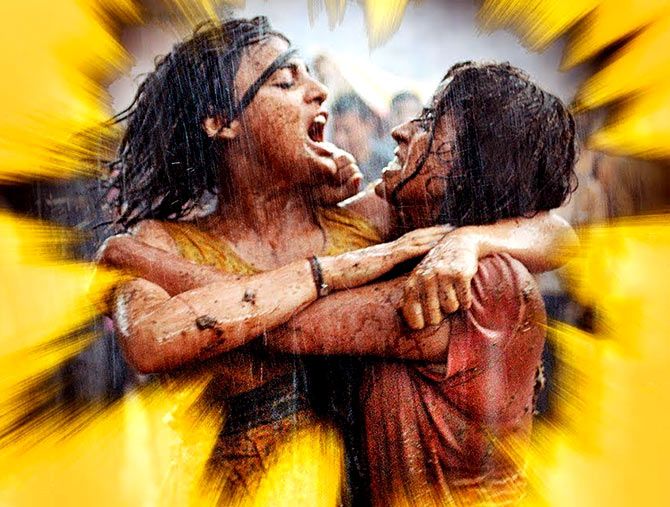
Vishal Bhardwaj's latest is basically a Nonsense Poem padded up with a message.
Imagine Lewis Carroll's whimsical and immensely pleasure-giving The Walrus and The Carpenter being pitched as a poem about the importance of Oyster Conservation. Not quite the same thing, right?
That's the sort of movie Pataakha is -- one that does not have the courage to recognise and embrace wholeheartedly the music that resides within its meaninglessness.
So Bhardwaj turns a tale of two warring sisters into a forced allegory about India and Pakistan, committing thereby the howler of the year.
Worse, he doesn't vary the rhythm of the catfights or the scenes in general (The frames are so sparse, they clearly look assembled); trusting instead, his colourful dialogues to carry you along (they don't).
The performances are all sincere, but they are not allowed to break through the strict vigil that Bhardwaj maintains over the proceedings. (His scenes have stopped breathing, of late).
I had said elsewhere that Vishal Bhardwaj the writer is having a difficult time letting Vishal Bhardwaj the director grow into his own person. That could very well be the case.
Giving up on your idols is never easy, but the great man may be struggling here.
9. Tumbbad
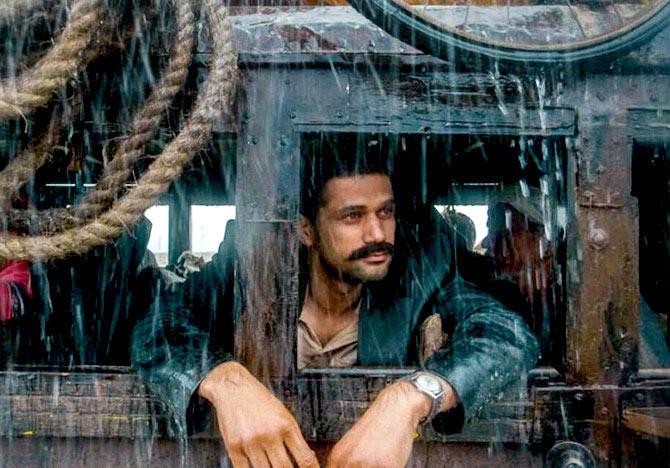
I have a working theory to offer.
You will love Tumbbad if you are one of those who loved Koyaanisqatsi, the 1982 silent American film that spawned believers out of the romanticising of subjects such as man's greed, decay, and demolition.
The problem with Tumbbad -- and I may be alone in thinking it slight -- is that its meanings never multiply.
No new perceptions are added to the central question of 'Is there an end to man's greed?' and the narrative goes around in circles as we are presented with variations on the theme of decadence.
My guess is that the screenplay was culled out of a sprawling material and the stuff that were lost in the extrication process -- especially a lot of the domestic scenes and scenes set in Pune of the 1930s -- contained clues to the magic that is missing.
Those domestic and social scenes had to be fully developed for the horror to work.
I am yet to read an emotional reaction to the film ('It was great because it was so atmospheric,' is not reason enough to love a motion picture).
Then there are those who claimed this to be a gorgeous-looking film because the frames seemed as though they were smeared in graphic paint. But isn't beauty in cinema a function of 'movement' and 'density' and not one that is revealed only through moments of 'stasis'?
8. Stree
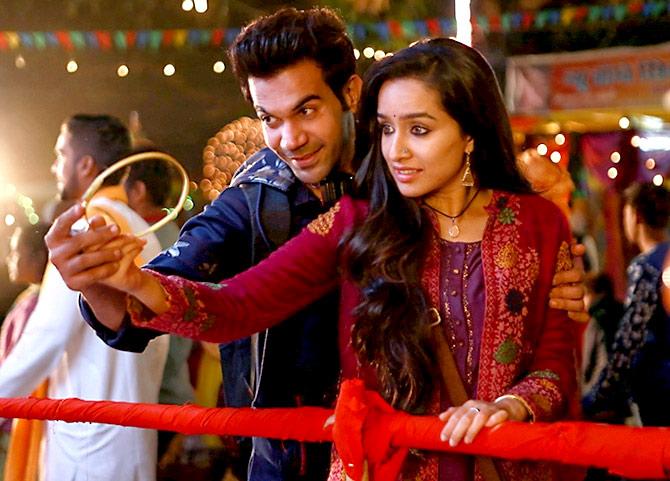
There is nothing more regressive than a piece of work that conservatively follows ideas that are 'in'.
The Amar Kaushik-directed Stree is a series of trending topics transformed into plot points.
Not one element in the film seems to be emerging from a personal place (there is nothing like a Director's Fingerprint to be traced anywhere) and the idea is to move you by touching your sentimental hotspots. (Give patriarchy the finger; talk up feminism -- there's your movie!)
The beats of nearly every scene, whether scary or funny, can be predicted from a mile away, and the cast (Rajkummar Rao and Pankaj Tripathi, included) get away by acting with themselves (If, in Bareilly Ki Barfi, each actor worked to make the other actors vivid to us; here, there are hardly any frames of the actors playing off each other).
I can precisely remember the one time I chuckled -- at a shot that casually spelled out the life-span of a sewing machine (1964-1983, the epitaph read).
But then, barely anyone else in the theatre laughed, proving, thereby, that the movie wasn't for me.
7. Raazi
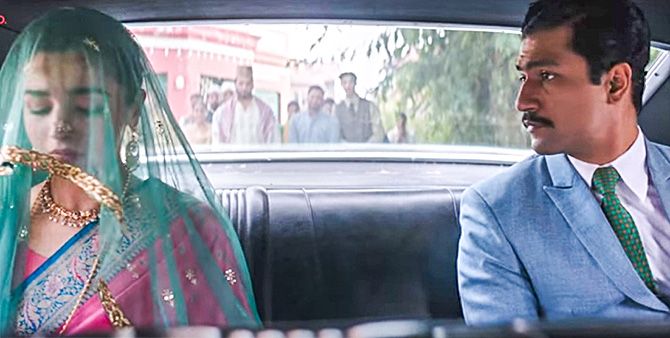
The problems in Raazi begin right at its source.
Anybody, who has read anything worthwhile, will tell you that the essence of the story told in Harinder Sikka's Calling Sehmat just did not seem well-proportioned.
If Sikka's tale was indeed true, it was still missing a lot of crucial details.
Primary among them was the human detail.
It's fair to imagine that the protagonist Sehmat -- an Indian spy who was supposedly married off to a Pakistani soldier, and who then engineered the death of three of her family members in Pakistan -- would have lost a lot more than her loved ones.
She would also have had to surrender her sense of 'self' and endanger her soul while at national duty.
Her condition, thus, cannot be treated as simply a catalyst for a sentimental spy novel.
Director Meghna Gulzar and writer Bhavani Iyer neither question Sikka's storyline nor do they allow the tension between Sikka's writing and their own reading of the book to become evident in the film.
Consequently, Raazi comes off as 'oddly staged' and the situations and people rather 'conveniently set' and sometimes almost 'invented' in order to peddle a smooth three-act narrative (Rajit Kapoor's turn as the stiffly patriotic father has to be one of the most contrived acting pieces of the year).
Gulzar and Iyer's desire to sidestep cinematic clichés leads them to invent fresh problems. So while the Pakistani characters are carefully written to not make them evil, they also seem devoid of any sharpness.
The movie has one really cool passage though: A shot of Alia Bhatt and Vicky Kaushal in a car (with the song Dilbaro playing in the background), where she in her bridal avatar and he in his blue suit, try to work through their awkwardness -- there is a strange kind of eroticism there.
6. Padman
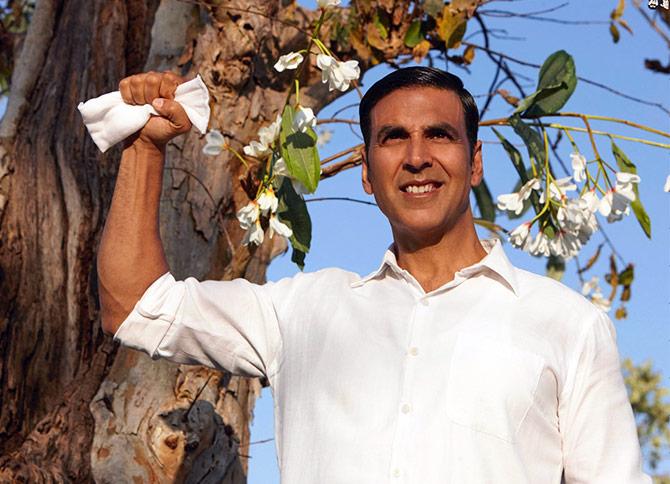
Certain subjects defeat film-makers who try taking them on; the subject of Padman, Arunachalam Muruganantham, is one such subject.
You only have to hear Muruganantham speak at any event to comprehend his talent for de-sentimentalising his achievements.
'Why did I try to make my version of a sanitary pad? Because I wanted to impress my wife' is one of his pet remarks.
Arunachalam Muruganantham's extravagantly insane story feels most unique when recounted by a worldly man like Muruganantham -- who seems to have never forgotten that his attempt to manufacture low-cost sanitary pads started primarily as an exercise in boosting his own ego.
The director of Padman, R Balki, with that streak of advertising naiveté in him, is just not the person to understand Muruganantham or his world: Balki first sweetens his protagonist and then fails to give personality to anyone else. (This is a film that achieves the unique distinction of turning Radhika Apte into a bore).
When the Muruganantham character, played by an overtly cheerful Akshay Kumar, acts all confused about why people in his rural town are so secretive about the topic of menstruation, he is less a 'progressive man' and more a 'man from Mars'.
The film tries to score points by making educated, urban folks feel good about having the right point-of-view on social issues. It is a gift to extreme liberals!
5. Padmaavat

I agree it is sort of unsophisticated to thrash Sanjay Leela Bhansali without acknowledging the effort that goes into his each frame.
And yet, one is compelled to ask: 'Effort to meet what end, exactly?'
In Padmaavat, as in his past 'spectacles', Bhansali's scenes of the exterior world are canned entirely inside the dead ambience of studios with hardly any attempts made to pipe in outdoor resonances. (The landscapes look unauthentic; the sounds -- such as the chirping of birds -- are electronic).
This explains why, ironically enough, Bhansali's spectacles have started to feel 'crummy'.
And if problems with its technical conception weren't enough, the thinking in Padmaavat is askew too.
Bhansali's spectacles are obviously not interested in testing the actual smell and feel of the Indian experience.
But even within the range of his pet theorem -- of passion being an all-consuming force -- all we are treated to are grand speeches about passion.
And when acting passionately becomes the need of the hour, Shahid Kapoor does something totally dumb, Deepika Padukone resorts to posturing, and Ranveer Singh abstains from sex and performs dry humping.
4. Kaalakandi

The most self-conscious film of the year.
Right from its opening sequence set inside a hospital, Kaalakandi feels tonally off. The lines uttered tell us less about those uttering them and ring more like excuses to further the plot.
This is a movie where the effects of the scenes, almost all of them, seem worked out in advance.
The too clever back-and-forth, the small absurdities (one character shoots himself in the balls), hell, even the swear words come off as 'carefully planted'.
Akshat Verma directs his actors in a way that allows you to sense the absence of their creative participation.
The whole thing happens over the course of one night, but none of the characters seem to have lived outside the duration of the movie.
Verma has tried to will a movie into existence without going through the actual steps of making the movie.
Kaalakandi comes alive briefly when Vijay Raaz and Deepak Dobriyal, playing two goons with trust issues, take to the screen.
But I guess there's something to be said about the attitude of a film which, when the time to dramatise its theme of karma comes, picks its two best actors to be bumped off.
3. Bhavesh Joshi Superhero
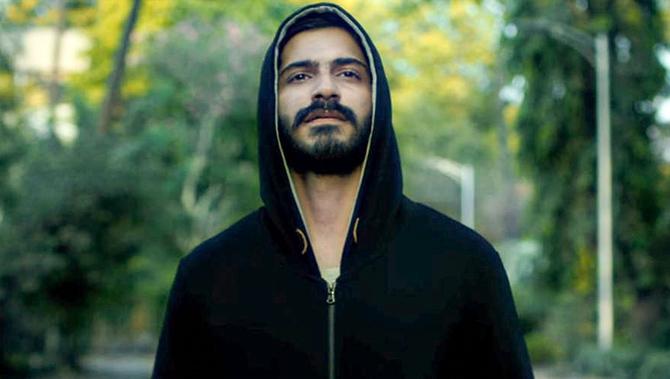
I heard someone say this: Watch Bhavesh Joshi Superhero because it is no Krrish.
My response: At least, Krrish is comfortable in its own skin, in its dumbness.
Bhavesh Joshi Superhero is a movie that never grew beyond its 'core idea'. (He is a superhero, but with a very modest name: This is the only joke in the movie, and it happens to be present in the title).
The basic pitch -- of a comic-book-junkie trying to recreate in life the patterns of his favourite pop art and grasping that reality is a lot more complex and real people a lot more complicated -- is a pitch that demanded a tone of satire.
But Director Vikramaditya Motwane approaches it with absolute self-seriousness.
So what was supposed to be a meditation on superhero movies turns out to be yet another dumb superhero movie where 'Good' and 'Bad' are made mutually exclusive.
Plus, typical of Motwane's style, he uses five shots to say something when just one would have been enough.
Then, there are characters trailing one another for 15 minutes. (Stretches where nothing happens for 15 minutes except the trailing).
Bhavesh Joshi doesn't suffer from an editing problem, but a problem of not having much to say: For if the scenes were brought down to their precise lengths, the movie would have been at least one hour shorter.
Motwane is no black satirist and his sequences are set up so that the surface cancels out the subtext.
How are we to read the acts of the boy-vigilantes, Sikander and Bhavesh? Are they playacting or are they serious about their pursuit?
Isn't there a sadness about the superhero refusing to jump a traffic signal (which is there to ensure the safety of people), and then riding his bike into a railway station and jeopardising the lives of those inside?
The truth is that we would not have cared if such gaffes were present in Krrish . But in a movie that wants to mock himbos like Krrish, the gaffes become grand sins.
I heard a lot of voices calling this one under-rated. Oh no, it's underdeveloped.
2. Dhadak

Oddly enough, the spirit of Dhadak can be discovered in a recent interview of Karan Johar's.
There he was, Johar, talking fervently about how the North-South Divide in Indian cinema is now disappearing. And to illustrate this fact he put forth such examples as S S Rajamouli's films, Shanker's brand of *high-concept* cinema, and Vijay's newest, Sarkar.
You could not have made a worse case for the diminishing divide between regional and Hindi cinema, than by praising a series of films of the straight Set Max-variety. What next? A sub-textual analysis of Sooryavansham?
We are living in an age of a small Assamese film, Village Rockstars, doing good numbers in Mumbai; an age of Angamaly Diaries forcing Bollywood directors to scour their own hometowns for stories; of Pariyerum Perumal setting off uncomfortable discussions among folks in Delhi.
I would happily take Karan Johar's cinema over Karan Johar's discourses on cinema and in reinforcing his Bombay Times-ish myopia about what constitutes 'Good Regional Cinema', I felt as though Johar had inadvertently blurted out the logic that powered Dharma's very managerial decision to remake Nagraj Manjule's Sairat.
This one is a prime example of Bollywood searching for its kind of mediocrity in a Regional Film. (Dhadak subverts the subversion of a typical Bollywood film, thus giving you a typical Bollywood film).
Wrongheaded is maybe the adjective that fits best.
For here is a film that uses the plot of Sairat but completely disregards its philosophy.
The philosophy of Sairat was to take the age-old Rich Girl-Poor Boy Bollywood trope and examine it unremittingly in a real context. It is the context that first takes a leave of absence in Dhadak.
It gets worse thereon.
And then there's the climax which wants to outdo the shocking climax of Sairat but which ends up validating the maxim that shock when pushed to its extreme, reverses its nature: It becomes comical.
1. Sanju
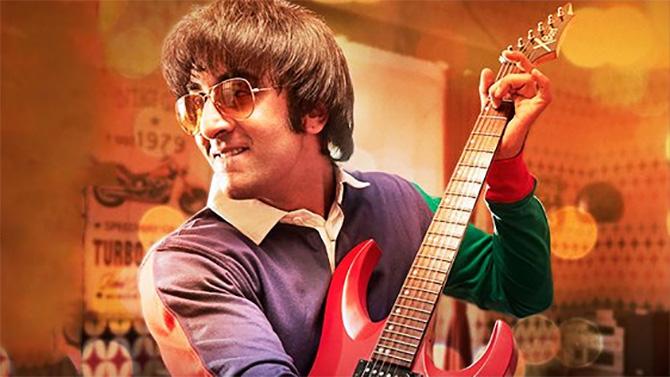
Walking out of Sanju, I drew a list of artists who could have possibly made sense of Sanjay Dutt. Here are their names: Norman Mailer, Alice Munro, Martin Scorsese (of the Taxi Driver-era, not the Wolf of Wall Street-era), Dileesh Pothan and Flannery O'Connor.
What binds the above mentioned artists is their respect for people whose impulses get the better of them.
These are artists who made it their business to understand individuals with abilities that are opposed to one another: Individuals who can be both saints and generals; who can be disciplined on one hand, and extremely spontaneous on the other; individuals who can perform great feats and then fritter them all away in a matter of seconds.
You needed an artist with some respect for complexity to tackle a subject like Sanjay Dutt. So imagine the horror of having Rajkumar Hirani, the most simple-minded of our film-makers, tackle it.
Hirani merely bundles all of Sanjay Dutt's complexities under one title: A flawed human being.
And since Hirani's idea of 'flaws' wouldn't go any farther than drug-taking, womanising, and drinking, he is forced to invent evil characters who can atone for those parts of Dutt's personality that are beyond his (Hirani's) comprehension.
(That even when it came to having a weapon for protection, Dutt could not think of anything less than an assault rifle, says a lot about the psychological make-up of the man -- but trying explaining that to a rationaliser like Hirani).
If there is a lesson to be learned from Sanju, it is that in this time of confounding realities, when audiences are looking for art that will sharpen their sense of reality, a thing such as Hirani and Abhijat Joshi's LCD (Laugh Cry Drama) Principle doesn't quite cut it.
To call this film an act of 'Whitewashing' or 'A PR Exercise' is to miss the point.
Sanju is what happens when we allow Simplifiers (a group that also comprises our Politicians, Marketers, and Twitter Warriors) to become our Conscience Keepers.











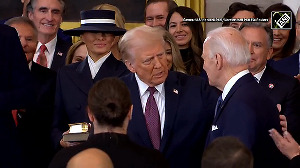
 © 2025
© 2025